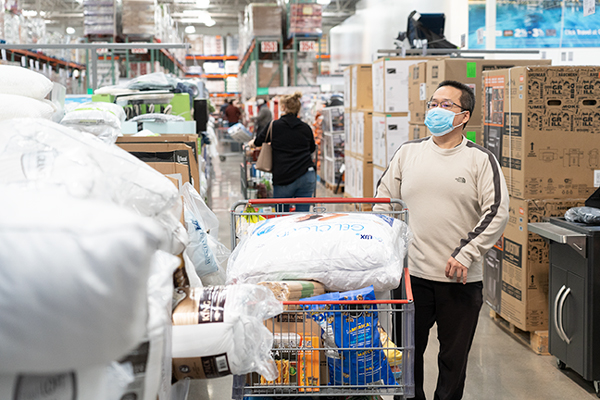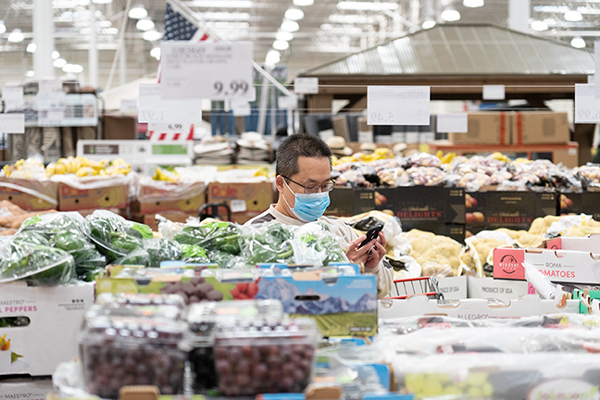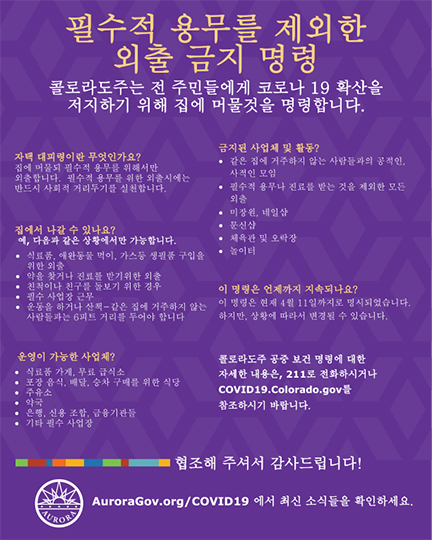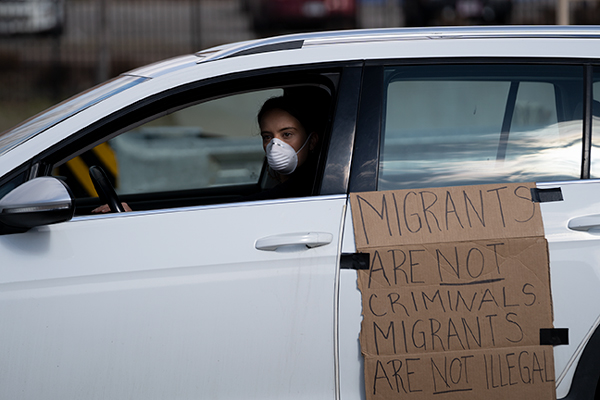
A mother in Littleton is spit on in front of her young children. A man is harassed while sitting in his car in Denver. An elderly business owner is accosted while grocery shopping in Lakewood.
Welcome to pandemic life for minorities in Colorado. Minority activists say that as unnerving as the COVID-19 crisis is for everyone, many racial and cultural minorities are getting an extra serving of stress right now.
Advocates say incidents of bias-motivated crime against Asian immigrants and Asian Americans are on the rise across the metroplex as officials scramble to simultaneously combat the novel coronavirus and the new waves of xenophobia the disease has sewn.
“We have been hearing more and more reports from our friends and community members about harassment that they’re getting while they’re out in public,” said Harry Budisidharta, executive director of the Asian Pacific Development Center in Aurora. “It ranges from spitting, to shoving, to yelling of racial slurs, to people backing away and looking visibly afraid.”
For the past couple of months, Budisidharta said his organization and its partners have been receiving weekly reports of such vitriol across the metroplex, even though much of it goes unreported.
“I think a lot of people are afraid of making reports to the police, particularly in light of how hostile the federal administration has been when it comes to immigration,” he said. “I know there’s a difference between federal and local, but I think for a lot of people, they don’t really draw that distinction.”
Indeed, reporting has been scant in Aurora and Denver in recent weeks. Aurora police had not received any recently documented reports of bias-motivated crimes against Asians or Asian-Americans as of April 14, according to a department spokesperson. There was one documented report Feb. 16 in Denver when an Asian man told officers another man yelled slurs at him through his car window. It was the first documented instance of a hate crime against a person who identified as Asian in the state’s capital city in more than a year, according to a spokesman for the Denver Police Department.
National figures show a more troubling trend. Kathy Ko Chin, president and CEO of the Asian and Pacific Islander American Health Forum, said organizations that track instances of hate against Asians have been receiving more than 100 reports of such incidents a day in recent months. That mirrors the number of reported hate crimes after Sept. 11, 2001.
And in the week after President Donald Trump referred to the new viral infection as the “China virus,” anti-Asian messages rose by nearly 170 percent on Twitter, according to a preliminary analysis of nearly 1 million tweets conducted by Gilbert Gee, a professor of community health sciences at UCLA. When used in tweets, the divisive phrase appeared more often in messages with so-called negative speech than the term “COVID-19.”
The World Health Organization in 2015 formally discouraged epidemiologists and politicians from prescribing geographic locations to diseases in an effort to stem stigmas.
Gee said a spike in racist speech in-person and online can exacerbate health issues in at-risk populations and prompt even more attacks on historically marginalized groups.
“Do we want to fool ourselves into thinking that the fight is against other people and waste our energy blaming them, or face the reality that we live on a planet where pathogens are constantly emerging from everywhere?,” Gee said on a call with reporters earlier this week. “ … Blaming other people will give us some temporary comfort through the illusion of control, but it is ultimately counterproductive. Now is the time for solidarity, not slurs.”

Viral outbreaks of bigotry
Like the terse and sometimes ephemeral missives shot through Twittersphere, anecdotal instances of racism against Asians and Pacific Islanders have been more frequent across the census tract that traverses Lakewood, Denver and Aurora, according to Fran Campbell, president of the Asian Chamber of Commerce of Colorado. She said she was recently made aware of a Korean adoptee who was spit on at the King Soopers on the corner of South Wadsworth Boulevard and West Chatfield Avenue in Littleton. Shortly before that, she was contacted by a native Hawaiian woman who was the target of racist remarks at another King Soopers near the intersection of West Florida Avenue and South Kipling Parkway in Lakewood.
A resident of Lakewood herself, Campbell said she recently hasn’t been going anywhere without her husband, who’s white.
“I kind of borrow my husband’s white privilege to protect myself, and that’s a sad state of affairs,” she said.
Other instances of racism targeted at Asians were reported in Aurora’s Asian Avenue Magazine earlier this month. Campbell pointed to additional virtual attacks in which trolls have inundated Yelp and Facebook business pages of Asian restaurants, claiming the establishments have been buying tainted meat.
The disinformation has resulted in multiple Asian grocers and restaurateurs reporting 50 percent dips in business in recent months — weeks before stay-at-home orders were ubiquitous, according to Campbell.
“The Asian community has been dealing with Chinese and Asian paranoia since January,” she said. “Even before the coronavirus came to America people were so paranoid about the Chinese and Asians that people stopped going to their businesses. Restaurants and markets out there in Aurora and in Denver all of a sudden saw their patronage just drop.”
To combat the rise in hate, an ad-hoc coalition of organizations that largely cater to the Asian community last week sent a letter to several area grocers, asking them to keep an eye out for such crimes, report any instances to local law enforcement or the Denver Police Department’s bias-motivated crimes section at 720-913-6458, and provide additional training to employees.
The letter was sent to the national offices of Target, Kroger and Albertsons. Campbell said she’s yet to receive a formal response.
Representatives from all three chains did not respond to requests for comment by press deadline.
The coalition, known as the COVID Asian Response Committee, has also recruited the help of metro area mayors and city council members who have vowed to bolster protections for vulnerable groups. Both Denver Mayor Michael Hancock and Gov. Jared Polis have issued public statements condemning hate against Asians.
“Denver values equity and inclusivity, and will not tolerate discrimination of any kind,” Hancock tweeted March 30. “It’s disturbing to learn that there are increasing reports of people in our Asian community being harassed and targeted for this epidemic.”
In Aurora, Mayor Mike Coffman has coordinated with Budisidharta and proposed a citywide resolution denouncing hate.
About 6 percent of Aurora’s 381,000 reported residents identified as Asian in 2019, according to recent demographic data compiled by the city’s planning and development services department. Another 0.3 percent of residents identified as Native Hawaiian or Pacific Islander.
About a quarter of the Aurora residents born outside of the U.S. are from Asia, and nearly 15,000 residents speak an Asian language at home.

Words matter
Language barriers have presented a challenge for officials across the country in recent weeks as messages on social distancing and self-quarantining have trickled down from the Centers for Disease Control and Prevention.
Metro area governments and especially those in Aurora are focused on language issues because the area is so culturally diverse. Students in Aurora Public Schools speak well over 100 languages other than English at home, according to school district officials.
“As school districts were shutting down, there was no in-language information about why,” Chin with the Asian and Pacific Islander American Health Forum said. “As sheltering in place orders have rolled out, in many states, there’s no in-language explanation or information.”
She referred to one community group in Arkansas that had to hire a translator to provide emergency interpretation of a CDC flyer into Marshallese on Facebook Live.
Instances like that are why Chin’s group has created a central repository of translated COVID-19 information. The crowd-sourced library housed on the APIAHF website now covers nearly 130 languages.
In Aurora, a city where nearly one in five people were born outside of the U.S., officials are used to providing interpretation and translation services.
As COVID-19 cases began popping up in Colorado, Ricardo Gambetta and his team at the Office of International and Immigrant Affairs started devising a plan for how to get public health information —which was rapidly being released by federal, state and local governments — to Aurora’s non-English speakers.
“During this time, one of the most important responsibilities is to make sure everyone in the city has access to this critical health and safety information, including those who are not English speakers,” Gambetta, who manages the office, said. “Time is everything so we tried to provide translation services in a short period of time.”
In a span of two weeks Gambetta said his office, working with vendors across the metro area, were able to put out a dozen documents in 10 languages.
Gambetta estimates that about 85 percent of non-English calls the city gets are from Spanish speakers. The remaining 15 percent make up eight other languages the office has been translating information to. They include Korean, Vietnamese and Chinese as well as Nepali, Burmese, Tigrinya, Nepali and Karen.
The documents are posted on the office’s Facebook page as quickly as possible and a bevy of volunteers, called “natural helpers”, relay important information back to their communities. The volunteer program has trained 160 people representing 28 different countries over the past four years.
“When (agencies) release any updates or health information, we need to ensure the information reaches different segments of the communities,” Gambetta said. “We’re talking about life and death, we’re talking about emergencies.”
Translation is a normal function of the office, but the amount of information in a limited amount of time is what made this situation different. The turnaround time for Spanish documents is about 24 hours and 48 hours for other languages.
“We feel comfortable that we’re reaching most everybody,” Gambetta said. “There’s no guarantee it’s 100 percent but I feel confident.”
The city is also distributing different information to non-English newspapers, television networks and radio shows that can also help spread the word about new health orders or recommendations.
Coffman said he applauds the work that Gambetta and the office has been doing, reaching out to the community and making sure they have the information they need about the virus of the business relief efforts.
The effects on immigrant-owned small businesses have been particularly harrowing, he said.
“These are heart-wrenching stories, and they are for everybody, but you know they work so hard for the American dream and they sacrifice so much and all this comes down on them,” Coffman said. “There have been people that were crying to me on the phone. I did visit some, with social distancing, of course.”
Coffman has been logging his own efforts of support on Facebook and Twitter. Each week the mayor, donning a face mask, gets dinner from a different local restaurant. “Oh, it’s so good,” Coffman said of the food. On Monday, he grabbed a burger and posed for a photo at Sam’s No. 3 diner on South Havana Street.
The chicken enchiladas with green salsa at El Camaron Loco were “fantastic,” he tweeted last week, and the sauces at Angry Chicken, the Korean-style fried chicken also located on Havana, were “incredible.”
Before health orders prevented dining-in, Coffman launched a challenge to the entire city to visit local eateries more. As the pandemic has worsened, Coffman stuck with the challenge, but has asked Aurora residents to order a curbside meal at least once a week to help keep those places in business.

Different races, different realities
But the pandemic that has upended life across the globe has fanned the flames of hate against more than just Asians and Asian Americans. An uptick in racist speech can have a cascading effect for other marginalized groups, too, experts say.
“Discrimination against one group can give permission to discriminate against other groups,” Gee with UCLA said.
For Lizeth Chacon, the fact that many workers still staffing hospitals, grocery stores and restaurants are immigrants is far from a guarantee that immigrant communities will become more respected in the U.S. Chacon is Executive Director of Colorado People’s Alliance and a native of Mexico.
“I think that African, Latin American and Asian immigrants are the majority who are out there who are risking their lives,” she said. “I would hope that that would change, but it is going to take a lot of work. We live in a country that is very racist.”
Chacon is particularly worried about undocumented Aurorans counting among the estimated 10.5 million undocumented living in the U.S.
She said these residents are likely to be working low-wage jobs putting themselves at risk of infection, often without health insurance. They’re also more at risk of working for employers disregarding social distancing rules, she said, because they’ve learned not to complain while living in America for risk of becoming noticed and deported.
But if undocumented workers have been laid off, they are not eligible to receive federal assistance such as the $1,200 stimulus check Congress approved last month as part of the CARES Act. Nor will undocumented residents, who pay taxes, be eligible for state unemployment benefits, Chacon said, without a work permit or special status.
“Undocumented immigrants will get nothing. Literally, they will lose their job and nothing will come,” she said of the government benefits.
In other states including California and Oregon, local governments and community organizations are setting up their own relief funds specifically for undocumented people. Chacon said COPA will be pressing local and state officials to set up a similar fund to help undocumented Aurorans and Coloradans who are slipping through the safety net.
Even legal resident Berhanu Ayele, an Aurora resident originally from Ethiopia, is suspicious of federal benefits. He said he hasn’t applied for any assistance even after losing his only job last week, as a wheelchair pusher at Denver International Airport.
As a Green Card holder, Ayele is expected to benefit from the federal stimulus package, according to a story by the Associated Press.
But he’s nervous that receiving government assistance could help land him and his family back in Ethiopia under a recent rule change by the Trump administration. The U.S. Supreme Court affirmed this year the federal government could disqualify immigrants from a bid for legal citizenship or permanent residency for receiving assistance such as food stamps, housing vouchers and Medicaid.
Attorneys generals asked the Supreme Court this week to temporarily suspend the rule, called the public charge rule, during the pandemic.
“Can I take that help or not? Does that help me or block me? Everything is not clear,” Ayele said.
According to the immigrants rights group Protecting Immigrant Families, accepting a stimulus check would not count against a resident immigrant under the public charge rule.
Ayele said he doesn’t need benefits either way, but said so many other immigrants do. And after watching the federal government count points against an immigrant for receiving traditional assistance during a global economic collapse, he said he’s lost a rosy vision of what America represents.
“For me,” Ayele added, “this is a turning point.”

